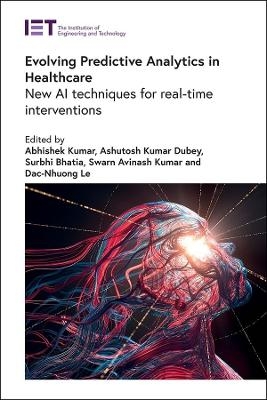
Evolving Predictive Analytics in Healthcare
Institution of Engineering and Technology (Verlag)
978-1-83953-511-6 (ISBN)
A major use of practical predictive analytics in medicine has been in the diagnosis of current diseases, particularly through medical imaging. Now there is sufficient improvement in AI, IoT and data analytics to deal with real time problems with an increased focus on early prediction using machine learning and deep learning algorithms. With the power of artificial intelligence alongside the internet of 'medical' things, these algorithms can input the characteristics/data of their patients and get predictions of future diagnoses, classifications, treatment and costs.
Evolving Predictive Analytics in Healthcare: New AI techniques for real-time interventions discusses deep learning algorithms in medical diagnosis, including applications such as Covid-19 detection, dementia detection, and predicting chemotherapy outcomes on breast cancer tumours. Smart healthcare monitoring frameworks using IoT with big data analytics are explored and the latest trends in predictive technology for solving real-time health care problems are examined. By using real-time data inputs to build predictive models, this new technology can literally 'see' your future health and allow clinicians to intervene as needed.
This book is suitable reading for researchers interested in healthcare technology, big data analytics, and artificial intelligence.
Abhishek Kumar is an assistant professor in the Department of Computer Science and Engineering at the Institute of Engineering and Technology, Chitkara University, India. He has a Doctorate in Computer Science from the University of Madras and is a Post-Doctoral Fellow of the Ingenium Research Group, Universidad De Castilla-La Mancha, Spain. He has published over 80 journal papers and edited 21 books. His research areas include artificial intelligence, image processing, computer vision, data mining, and machine learning. Ashutosh Kumar Dubey is an associate professor in the Department of Computer Science and Engineering at the Institute of Engineering and Technology, Chitkara University, India. He is a Senior Member of IEEE and ACM. His research interests include machine learning, health informatics, and cloud computing. Surbhi Bhatia is an associate professor at the College of Computer Sciences and Information Technology, King Faisal University, Saudi Arabia. She is PMP certified from PMI, USA. She has published 75 papers in reputed journals and conferences and edited 9 books. She has 9 patents from the USA, Australia, and India and has completed 5 research projects from the Ministry of Education and DSR, Saudi Arabia. Her research interests include sentiment analysis, data analytics, and machine learning. Swarn Avinash Kumar is an applied research scientist at Meta Platforms, Inc. (previously Facebook), USA. He has previously worked in software engineering roles at Lyft Inc., Google and Amazon. He has filed multiple patents in the autonomous industry and the machine learning sphere. His research interests include robotics, deep learning, natural language processing, and computer vision. Dac-Nhuong Le is an associate professor in the Department of Computer Science and head of the Faculty of Information Technology at Haiphong University, Vietnam. He has more than 20 years of academic teaching experience and has published more than 80 papers, presentations, and book chapters. His research interests include evolutionary multi-objective optimization, network communication and security, cloud computing, and virtual/argument reality.
Chapter 1: COVID-19 detection in X-ray images using customized CNN model
Chapter 2: Introducing deep learning in medical diagnosis
Chapter 3: Intelligent approach for network intrusion detection system (NIDS) utilizing machine learning (ML)
Chapter 4: Classification methodologies in healthcare
Chapter 5: Introducing deep learning in medical domain
Chapter 6: Deep-stacked autoencoder for medical image classification
Chapter 7: Comparison of machine learning and deep learning algorithms for prediction of coronary heart disease
Chapter 8: Revolution in technology-enabled healthcare: Internet of Things
Chapter 9: Smart healthcare monitoring framework using IoT with big data analytics
Chapter 10: Experimental analysis and investigation of dementia detection framework using EHR-based variant LSTM model
Chapter 11: An intelligent agent-based distributed patient scheduling using token-based coordination approach: a case study
Chapter 12: Internet of Things (IoT) for the efficient healthcare system
Chapter 13: Comprehension of melody representation and speed-up approaches for query by humming system
Chapter 14: Python for digital health solutions: elevated outcomes
Chapter 15: IoT-enabled healthcare - a paradigm shift
Chapter 16: IoT-based cardiovascular prediction framework using deep learning algorithms
Chapter 17: An intelligent approach using convolutional neural network (CNN) for early detection of melanoma and other skin diseases
Chapter 18: Self-organizing deep learning approach for controlling movements of wheeled apparatus through corneal connotation
Chapter 19: Prediction of breast tumour outcome to chemotherapy using statistical MR images through deep learning approaches
Chapter 20: Risk analysis and prediction of cancer associated with Type II diabetes: a review
| Erscheinungsdatum | 26.10.2022 |
|---|---|
| Reihe/Serie | Healthcare Technologies |
| Verlagsort | Stevenage |
| Sprache | englisch |
| Maße | 156 x 234 mm |
| Themenwelt | Informatik ► Theorie / Studium ► Künstliche Intelligenz / Robotik |
| Medizin / Pharmazie ► Physiotherapie / Ergotherapie ► Orthopädie | |
| Technik ► Medizintechnik | |
| ISBN-10 | 1-83953-511-3 / 1839535113 |
| ISBN-13 | 978-1-83953-511-6 / 9781839535116 |
| Zustand | Neuware |
| Informationen gemäß Produktsicherheitsverordnung (GPSR) | |
| Haben Sie eine Frage zum Produkt? |
aus dem Bereich


